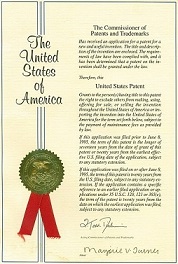US Patent No. 7,467,059 - Prepared by Attorney David Tran for Intel Corporation and filed by Intel Corporation
Brief description: For one embodiment, a thermal zone may include two or more components that are thermally controllable. A thermally controllable component may be able to provide information about its thermal condition. For one embodiment, a thermally controllable component is a component that is associated with a thermal sensor. The thermal sensor may be an embedded thermal sensor. The component may include a thermal interface to export or provide information about its thermal constraints, its thermal condition, etc. The thermal condition may include current temperature (e.g., 78 degrees Celsius). The thermal condition may also include current thermal load (CTL) (e.g., 4 Watts). Being thermally controllable may also include the component having the ability to provide information about its thermal constraints. The thermal constraints may include trip point value(s), information about possible performance state(s) (P states) and/or possible throttle state(s) (T states), etc. The thermal constraints may include load information when the component is idle and its maximum load information so that given a current load, the effect of a control (e.g., P state or linear throttle) may be inferred. A trip point value may be a temperature value that when the current temperature of the thermally controllable component crosses or violates, a signal is generated by the component. A thermally controllable component may have one or more trip point values. The trip point values may be preset and may be dynamically modified by software. Each trip point value may be associated with a different temperature (e.g., hot, critical, catastrophic, or intermediate etc.) and, when crossed, may necessitate different types of cooling operations to be performed.
